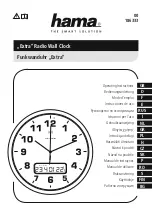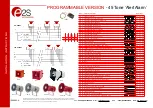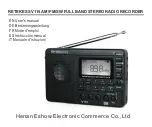
SeaTrac Serial Command Interface Reference
Page 116
8.3.1.
CID_DAT_SEND
The CID_DAT_SEND command is issued to send a packet of data to another remote beacon,
optionally requesting that the remote beacon acknowledge reception of the data.
If the command requires an acknowledgement (ACK), then at some point later upon reception
of the response message a
message will be output containing the ACK flag
and any additional remotely queued data that has been transmitted back.
If successful, the CID_DAT_SEND command will start an acoustic message
transmission, and at some time later an acoustic response will be heard.
The DAT protocol handler will generate subsequent serial message to signal when
these event occur.
Additionally acoustic transceiver diagnostic messages are available to monitor activity
and obtain further information on the received signal levels – see section 7.6 on page
92 for further details.
When sending DAT data, be aware that larger quantities of data will take longer to
send (by 80ms per byte), and during this time the receiver may become more
susceptible to errors caused by Doppler shift or other interference, and the statistical
probability of the CRC16 checksum algorithm (used by the acoustic transceiver)
uniquely validating the message content becomes reduced.
Where possible it is recommended (but not required) to limit packet lengths to
between 16 to 20 bytes.
Command Message Parameters
Parameter Type Description
MSG_ID
identification code (CID_DAT_SEND)
DEST_ID
The ID code of the beacon to send the DATA to.
Valid values are form 0 to 15.
A value of BEACON_ALL (0) indicates data is
broadcast to all other beacons. However when this
is used the SEND_MODE value can only be NOACK
or NACK_USBL.
MSG_TYPE
Value specifying the type of data message that
should be sent
Valid values are…
MSG_OWAY
Data is sent one-way with no USBL signal request,
and no response acknowledgment is required.
As no USBL signal or response is used, no ranging
or position fix will be available on receipt on this
message.
















































